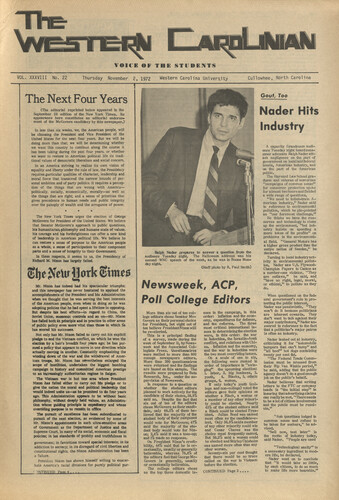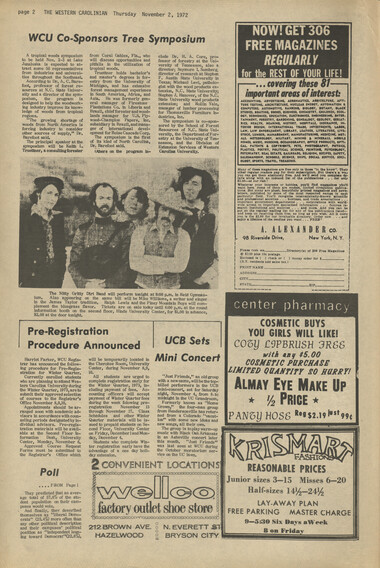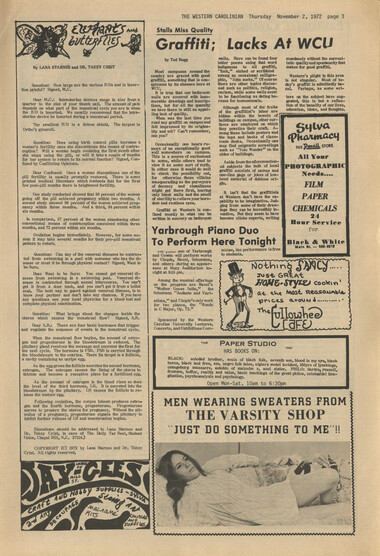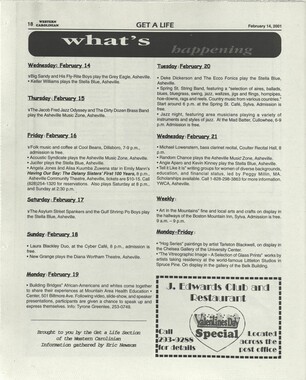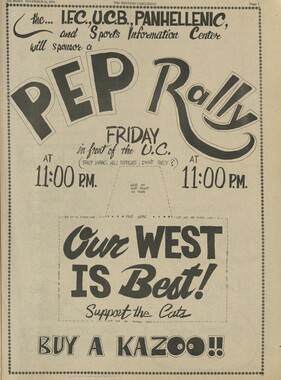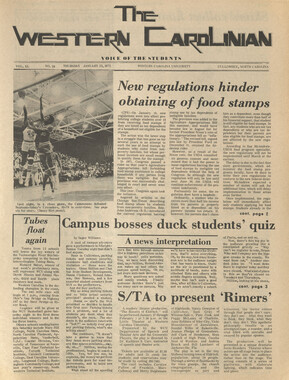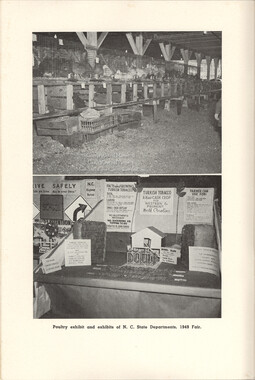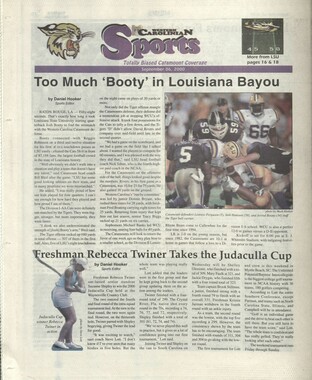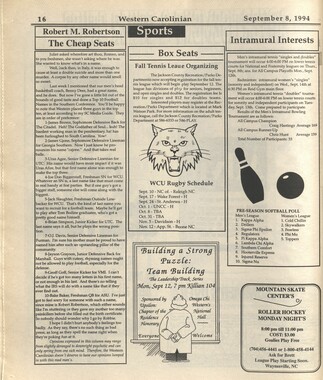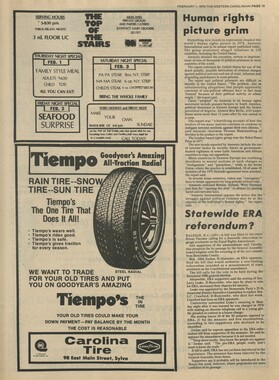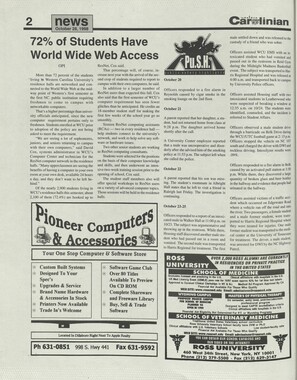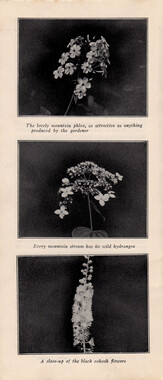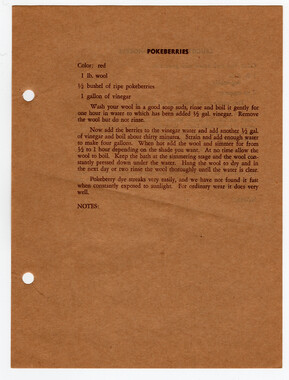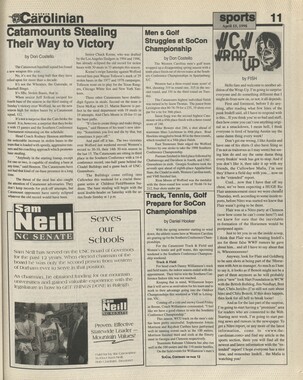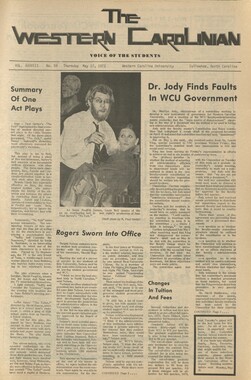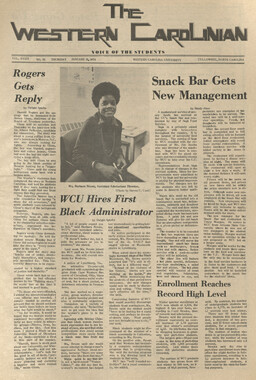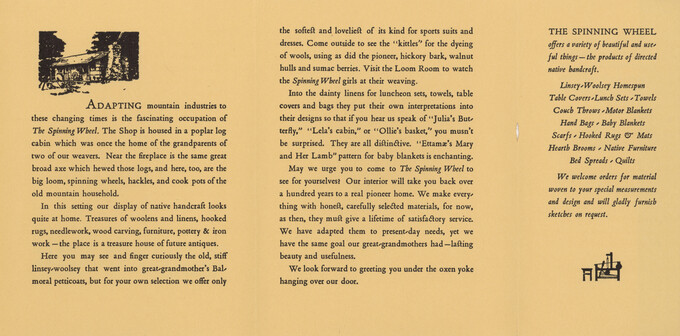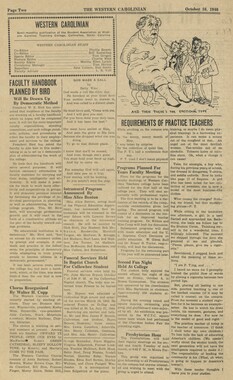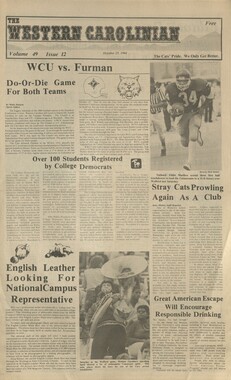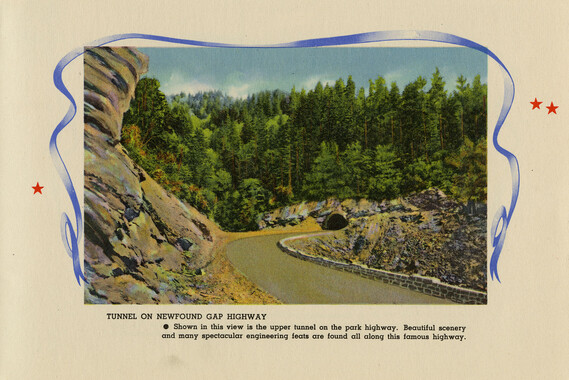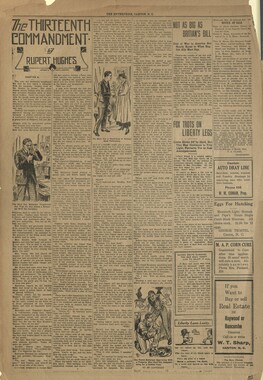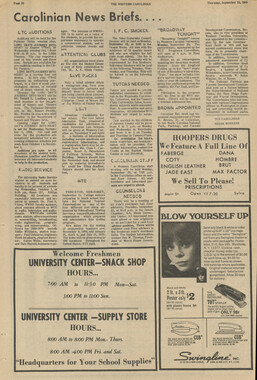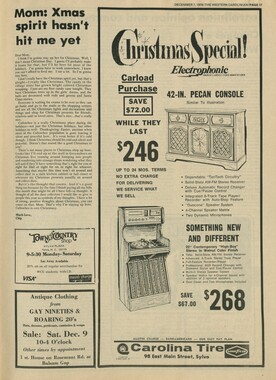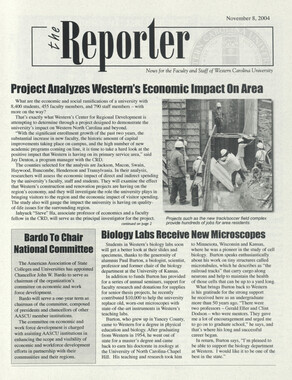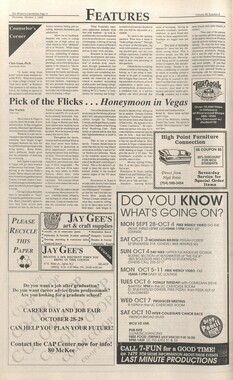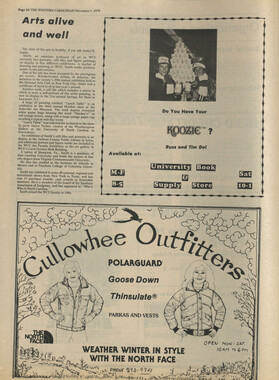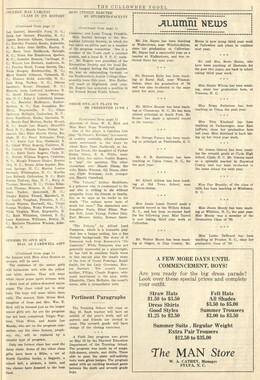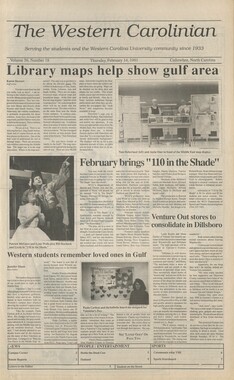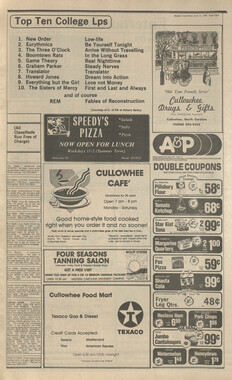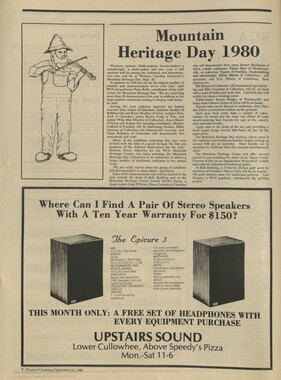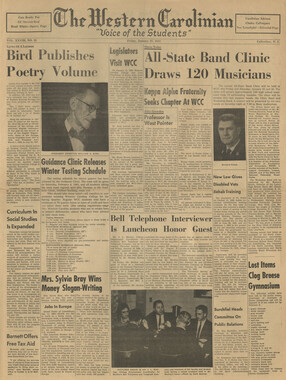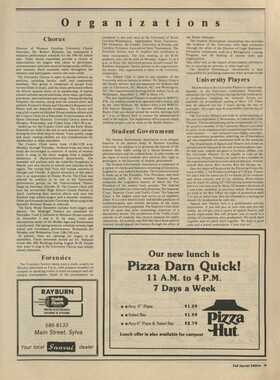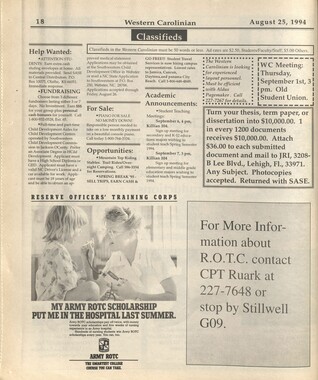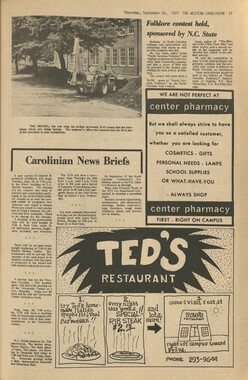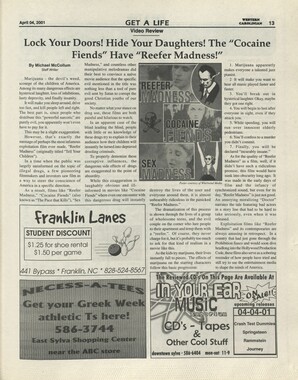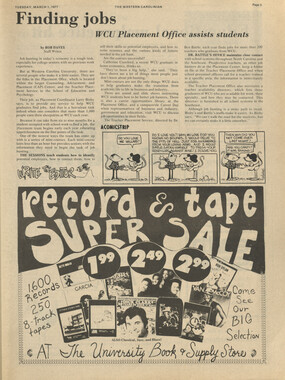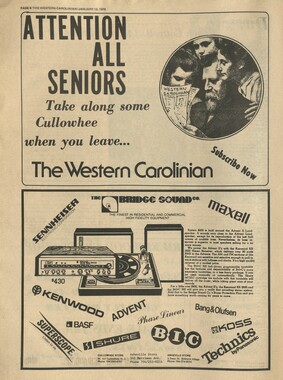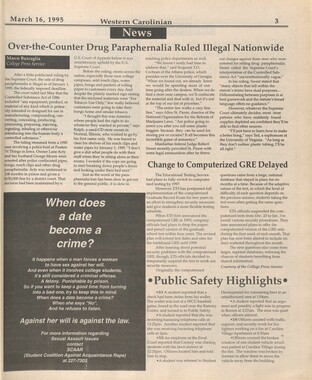Western Carolina University (20)
View all
- Canton Champion Fibre Company (2308)
- Cherokee Traditions (293)
- Civil War in Southern Appalachia (165)
- Craft Revival (1942)
- Great Smoky Mountains - A Park for America (2767)
- Highlights from Western Carolina University (430)
- Horace Kephart (941)
- Journeys Through Jackson (154)
- LGBTQIA+ Archive of Jackson County (24)
- Oral Histories of Western North Carolina (314)
- Picturing Appalachia (6772)
- Stories of Mountain Folk (413)
- Travel Western North Carolina (160)
- Western Carolina University Fine Art Museum Vitreograph Collection (129)
- Western Carolina University Herbarium (92)
- Western Carolina University: Making Memories (708)
- Western Carolina University Publications (2283)
- Western Carolina University Restricted Electronic Theses and Dissertations (146)
- Western North Carolina Regional Maps (71)
- World War II in Southern Appalachia (131)
University of North Carolina Asheville (6)
View all
- Allanstand Cottage Industries (62)
- Appalachian National Park Association (53)
- Bennett, Kelly, 1890-1974 (1388)
- Berry, Walter (76)
- Brasstown Carvers (40)
- Carver, George Washington, 1864?-1943 (26)
- Cathey, Joseph, 1803-1874 (1)
- Champion Fibre Company (233)
- Champion Paper and Fibre Company (297)
- Cherokee Indian Fair Association (16)
- Cherokee Language Program (22)
- Crowe, Amanda (40)
- Edmonston, Thomas Benton, 1842-1907 (7)
- Ensley, A. L. (Abraham Lincoln), 1865-1948 (275)
- Fromer, Irving Rhodes, 1913-1994 (70)
- George Butz (BFS 1907) (46)
- Goodrich, Frances Louisa (120)
- Grant, George Alexander, 1891-1964 (96)
- Heard, Marian Gladys (60)
- Kephart, Calvin, 1883-1969 (15)
- Kephart, Horace, 1862-1931 (313)
- Kephart, Laura, 1862-1954 (39)
- Laney, Gideon Thomas, 1889-1976 (439)
- Masa, George, 1881-1933 (61)
- McElhinney, William Julian, 1896-1953 (44)
- Niggli, Josephina, 1910-1983 (10)
- North Carolina Park Commission (105)
- Osborne, Kezia Stradley (9)
- Owens, Samuel Robert, 1918-1995 (11)
- Penland Weavers and Potters (36)
- Roberts, Vivienne (15)
- Roth, Albert, 1890-1974 (142)
- Schenck, Carl Alwin, 1868-1955 (1)
- Sherrill's Photography Studio (2565)
- Southern Highland Handicraft Guild (127)
- Southern Highlanders, Inc. (71)
- Stalcup, Jesse Bryson (46)
- Stearns, I. K. (213)
- Thompson, James Edward, 1880-1976 (226)
- United States. Indian Arts and Crafts Board (130)
- USFS (683)
- Vance, Zebulon Baird, 1830-1894 (1)
- Weaver, Zebulon, 1872-1948 (58)
- Western Carolina College (230)
- Western Carolina Teachers College (282)
- Western Carolina University (1794)
- Western Carolina University. Mountain Heritage Center (18)
- Whitman, Walt, 1819-1892 (10)
- Wilburn, Hiram Coleman, 1880-1967 (73)
- Williams, Isadora (3)
- Cain, Doreyl Ammons (0)
- Crittenden, Lorraine (0)
- Rhodes, Judy (0)
- Smith, Edward Clark (0)
- Appalachian Region, Southern (2393)
- Asheville (N.C.) (1887)
- Avery County (N.C.) (26)
- Blount County (Tenn.) (161)
- Buncombe County (N.C.) (1664)
- Cherokee County (N.C.) (283)
- Clay County (N.C.) (555)
- Graham County (N.C.) (233)
- Great Smoky Mountains National Park (N.C. and Tenn.) (478)
- Haywood County (N.C.) (3522)
- Henderson County (N.C.) (70)
- Jackson County (N.C.) (4692)
- Knox County (Tenn.) (25)
- Knoxville (Tenn.) (12)
- Lake Santeetlah (N.C.) (10)
- Macon County (N.C.) (420)
- Madison County (N.C.) (211)
- McDowell County (N.C.) (39)
- Mitchell County (N.C.) (132)
- Polk County (N.C.) (35)
- Qualla Boundary (981)
- Rutherford County (N.C.) (76)
- Swain County (N.C.) (2113)
- Transylvania County (N.C.) (247)
- Watauga County (N.C.) (12)
- Waynesville (N.C.) (68)
- Yancey County (N.C.) (72)
- Aerial Photographs (3)
- Aerial Views (60)
- Albums (books) (4)
- Articles (1)
- Artifacts (object Genre) (228)
- Biography (general Genre) (2)
- Cards (information Artifacts) (38)
- Clippings (information Artifacts) (191)
- Crafts (art Genres) (622)
- Depictions (visual Works) (21)
- Design Drawings (1)
- Drawings (visual Works) (184)
- Envelopes (73)
- Facsimiles (reproductions) (1)
- Fiction (general Genre) (4)
- Financial Records (12)
- Fliers (printed Matter) (67)
- Glass Plate Negatives (381)
- Guidebooks (2)
- Internegatives (10)
- Interviews (811)
- Land Surveys (102)
- Letters (correspondence) (1013)
- Manuscripts (documents) (619)
- Maps (documents) (159)
- Memorandums (25)
- Minutes (administrative Records) (59)
- Negatives (photographs) (5835)
- Newsletters (1285)
- Newspapers (2)
- Occupation Currency (1)
- Paintings (visual Works) (1)
- Pen And Ink Drawings (1)
- Periodicals (193)
- Personal Narratives (7)
- Photographs (12975)
- Plans (maps) (1)
- Poetry (6)
- Portraits (1663)
- Postcards (329)
- Programs (documents) (151)
- Publications (documents) (2237)
- Questionnaires (65)
- Scrapbooks (282)
- Sheet Music (1)
- Slides (photographs) (402)
- Sound Recordings (796)
- Specimens (92)
- Speeches (documents) (15)
- Tintypes (photographs) (8)
- Transcripts (322)
- Video Recordings (physical Artifacts) (23)
- Vitreographs (129)
- Text Messages (0)
- A.L. Ensley Collection (275)
- Appalachian Industrial School Records (7)
- Appalachian National Park Association Records (336)
- Axley-Meroney Collection (2)
- Bayard Wootten Photograph Collection (20)
- Bethel Rural Community Organization Collection (7)
- Blumer Collection (5)
- C.W. Slagle Collection (20)
- Canton Area Historical Museum (2110)
- Carlos C. Campbell Collection (282)
- Cataloochee History Project (65)
- Cherokee Studies Collection (4)
- Daisy Dame Photograph Album (5)
- Daniel Boone VI Collection (1)
- Doris Ulmann Photograph Collection (112)
- Elizabeth H. Lasley Collection (1)
- Elizabeth Woolworth Szold Fleharty Collection (4)
- Frank Fry Collection (95)
- George Masa Collection (173)
- Gideon Laney Collection (452)
- Hazel Scarborough Collection (2)
- Hiram C. Wilburn Papers (28)
- Historic Photographs Collection (236)
- Horace Kephart Collection (861)
- Humbard Collection (33)
- Hunter and Weaver Families Collection (1)
- I. D. Blumenthal Collection (4)
- Isadora Williams Collection (4)
- Jesse Bryson Stalcup Collection (47)
- Jim Thompson Collection (224)
- John B. Battle Collection (7)
- John C. Campbell Folk School Records (80)
- John Parris Collection (6)
- Judaculla Rock project (2)
- Kelly Bennett Collection (1407)
- Love Family Papers (11)
- Major Wiley Parris Civil War Letters (3)
- Map Collection (12)
- McFee-Misemer Civil War Letters (34)
- Mountain Heritage Center Collection (4)
- Norburn - Robertson - Thomson Families Collection (44)
- Pauline Hood Collection (7)
- Pre-Guild Collection (2)
- Qualla Arts and Crafts Mutual Collection (12)
- R.A. Romanes Collection (681)
- Rosser H. Taylor Collection (1)
- Samuel Robert Owens Collection (94)
- Sara Madison Collection (144)
- Sherrill Studio Photo Collection (2558)
- Smoky Mountains Hiking Club Collection (616)
- Stories of Mountain Folk - Radio Programs (374)
- The Reporter, Western Carolina University (510)
- Venoy and Elizabeth Reed Collection (16)
- WCU Gender and Sexuality Oral History Project (32)
- WCU Mountain Heritage Center Oral Histories (25)
- WCU Oral History Collection - Mountain People, Mountain Lives (71)
- WCU Students Newspapers Collection (1744)
- Western North Carolina Tomorrow Black Oral History Project (69)
- William Williams Stringfield Collection (2)
- Zebulon Weaver Collection (109)
- African Americans (390)
- Appalachian Trail (35)
- Artisans (521)
- Cherokee art (84)
- Cherokee artists -- North Carolina (10)
- Cherokee language (21)
- Cherokee pottery (101)
- Cherokee women (208)
- Church buildings (167)
- Civilian Conservation Corps (U.S.) (110)
- College student newspapers and periodicals (1830)
- Dams (103)
- Dance (1023)
- Education (222)
- Floods (61)
- Folk music (1015)
- Forced removal, 1813-1903 (2)
- Forest conservation (220)
- Forests and forestry (917)
- Gender nonconformity (4)
- Great Smoky Mountains National Park (N.C. and Tenn.) (154)
- Hunting (38)
- Landscape photography (10)
- Logging (103)
- Maps (84)
- Mines and mineral resources (8)
- North Carolina -- Maps (18)
- Paper industry (38)
- Postcards (255)
- Pottery (135)
- Railroad trains (71)
- Rural electrification -- North Carolina, Western (3)
- School integration -- Southern States (2)
- Segregation -- North Carolina, Western (5)
- Slavery (5)
- Sports (452)
- Storytelling (245)
- Waterfalls -- Great Smoky Mountains (N.C. and Tenn.) (66)
- Weaving -- Appalachian Region, Southern (280)
- Wood-carving -- Appalachian Region, Southern (328)
- World War, 1939-1945 (173)
Western Carolinian Volume 38 Number 22
Item
Item’s are ‘child’ level descriptions to ‘parent’ objects, (e.g. one page of a whole book).
-
-
r Arnl ffyiAhi VOICE OF THE STUDENTS VOL. XXXVIII No. 22 Thursday November 2, 1972 Western Carolina University Cullowhee, North Carolina The Next Four Years (The editorial reprinted below appeared in the September 28 edition of the New York Times. Its appearance here constitutes an editorial endorsement of the McGovern candidacy by this newspaper.)' In less than six weeks, we, the American people, will be choosing the President and Vice President of the United States for the next four years. But we will be doing more than that; we will be determining whether we want this country to continue along the course it has been taking during the past four years, or whether we want to restore to American political life its traditional values of democratic liberalism and social concern. In an America striving to realize its own vision of equality and liberty under the rule of law, the Presidency requires ^particular qualities of character, leadership and moral force that transcend the narrow bounds of personal ambition and of party politics. It requires a perception of the things that are wrong with America— politically, socially, economically, morally—as well as the things that are right; and a sense of priorities that gives precedence to human needs and public integrity over the panoply of wealth and the arrogance of power. The New York Times urges the election of George McGovern for President of the United States. We believe that Senator McGovern's approach to public questions, his humanitariaaphilosophy and humane scale of values, his courage arid his forthrightness can offer a new kind of leadership in American political life. We believe he can restore a sense of purpose to the American people as a whole, a sense of participation to their component parts and a sense of Integrity to their Government. In these respects, it seems to us, the Presidency of Richard M. Nixon has largely failed. Mr. Nixon has indeed had his spectacular triumphs; and this newspaper has never hesitated to applaud the accomplishments of the President and his Administration when we thought that he was serving the best interests of the American people, even when in doing so he was adopting policies that he bad spent a lifetime in opposing. But despite 'bis best efforts—in regard to China, the Soviet Union, economic controls and so on—Mr. Nixon has failed both in principle and in practice in other areas of public policy even more vital than those in which He has scored his successes. Not only has Mr. Nixon failed to carry out his explicit pledge to end the Vietnam conflict, on which he won the election by a hair's breadth four years ago; he has pursued a policy that appears to move in one direction while actually moving in another. Constantly emphasizing the winding down of the war and the withdrawal of American troops, Mr. Nixon has nevertheless enlarged the scope of hostilities, undertaken the biggest bombing campaign in history and committed American prestige to an increasingly authoritarian regime in Saigon. The Vietnam war is but one area where President Nixon has failed either to carry out his pledge or to give the nation the moral and political leadership that would indeed unite us—as he promised to do four years ago. This Administration appears to be without basic philosophy, without deeply held values, an Administration whose guiding principle is expediency and whose overriding purpose is to remain in office The pursuit of excellence has -been subordinated to pursuit of the next election, as evidenced by some of Mr. Nixon's appointments in such ultra-sensitive areas of Government as the Department of Justice and the Supreme Court. In many of its social, economic and fiscal policies; in lax standards of probity and truthfulness in government; in favoritism toward special interests; in its addiction to secrecy; in its disregard of civil liberties and constitutional rights, the. Nixon Administration has been a failure. President Nixon has shown himself willing to exacerbate America's racial divisions for purely political pur- WTTNtiF.n Pare 4 Gout, Too Ralph Nader prepares to answer a question from the audience Tuesday night. The Halloween address was his second WNC speech of the week, as he was in Boone Monday night, (Staff photo by R. Paul Smith) Newsweek, ACP, Poll College Editors More than six out of ten college editors chose Senator McGovern as their personal choice for President, but eight out of ten believe PresidentNixon will be re-elected. This is a principal finding of a survey, made during the week of September 11, by Newsweek and the Associated Collegiate Press. Questionnaires were mailed to more than 800 college newspapers editors. More than 300 questionnaires were returned and the findings are based on this sample. The results were prepared by Beta Research, Inc., under the supervision of Newsweek. In response to a question on whether the student editors planned to work actively for the candidate of their choice, 58.9% said no. Despite the fact that six out of ten of the editors chose McGovern as their candidate, only 49.5% of them believed that the majority of the student body of their campuses would vote for McGovern; 47% said the majority of the student body would vote for Nixon; 2.4% said it was a toss-up; and 1% made no response. On President Nixon's credibility, 46% said that he is occasionally, usually or generally believable, whereas 76.6% of the editors feel that George McGovern is generally, usually or occasionally believable. The college editors chose as the top three domestic is sues in the campaign, in this order: inflation and the economy, expenditures for defense, and tax reforms. The three most critical international issues in determiningthe election were, in this order: the war in Indochina, the Israelin-Arab conflict, and relations with China. Inflation and the economy, and the war in Indochina were the two most overriding is sues. On a scale of one to six, the following were ranked in order of importance in "swinging" the upcoming election: 1. labor, 2. big business, 3. youth, 4. Blacks, 5. ethnic groups, 6. women. If only today's youth (college and non-college) voted the editors gave their opinions on whether a Black, a woman or a member of any other minority could be elected. Nearly 45% of the student editors said a Black could be elected President. Julian Bond was named most often as the candidate-elect, Only 36.9% said a member of any other minority could win and' Cesar Chavez was the choice most frequently named. But 50.2% said a woman could be elected and Shirley Chisholm was named more often than any other woman. Seventy-six per cent thought that there would be no truce called on the war in Vietnam before the election. CONTINUED Page 2 .... Nader Hits Industry A capacity Grandroom audience Tuesday night heard consumer advocate Ralph Nader attack negligence on the part of government on local and federal levels, American industry, and on the part of the American public. The Harvard Law School graduate and veteran of numerous "campaigns of common sense" for consumer protection spoke for almost two hours and fielded a wide range of questions. "We need to toilet-train A- merican industry," Nader said in reference to environmental pollution, which he pin-pointed as "our foremost challenge." He thinks we have the resources and technology to clean up the environment, "but industry insists on spending a mere token of its profits" on problems in the environmental field. "General Motors has a higher gross product than the entire nation of Sweden," he declared. Turning to local industry activity in environmental pollution, Nader saw U.S. Plywood- Champion Papers in Canton as a number-one violator. "They are outlaws," he said, and "have no right, legal, moral, or ethical," to pollute as they do. When questioned on the federal government's role in protecting the public interest, Nader was pessimistic. "They won't do it because politicians are inherent cowards. They dont want to talk against their major contributors," Nader answered in reference to the fact that a politician's major patron is often an industry. Nader lashed out at industry, criticizing it for "automobile bumpers that can't bump" and "all beef" hot dogs containing twenty per cent fat, "The Federal Trade Commission must be aroused from their Rip Van Winkle period," he said, adding that the public agency doesn't do a good enough job on the public's behalf. Nader believes that writing letters to the FTC or company heads is "the initial step" in insuring that advertising claims can really be met. "Thereneeds to be a lot of citizen involvement and the public must be resolute." "Ask questions lodged in common sense and refuse to be taken for suckers," he advised. "Sell now, test later" is the motto of industry today, said Nader. "People are used "Technological sanity" is a necessary ingredient in modern life, he declared. Nader went on to conclude that "it would take so little, by each citizen, to do so much to make life more bearable."
Object
Object’s are ‘parent’ level descriptions to ‘children’ items, (e.g. a book with pages).
-
The Western Carolinian is Western Carolina University's student-run newspaper. The paper was published as the Cullowhee Yodel from 1924 to 1931 before changing its name to The Western Carolinian in 1933.
-

